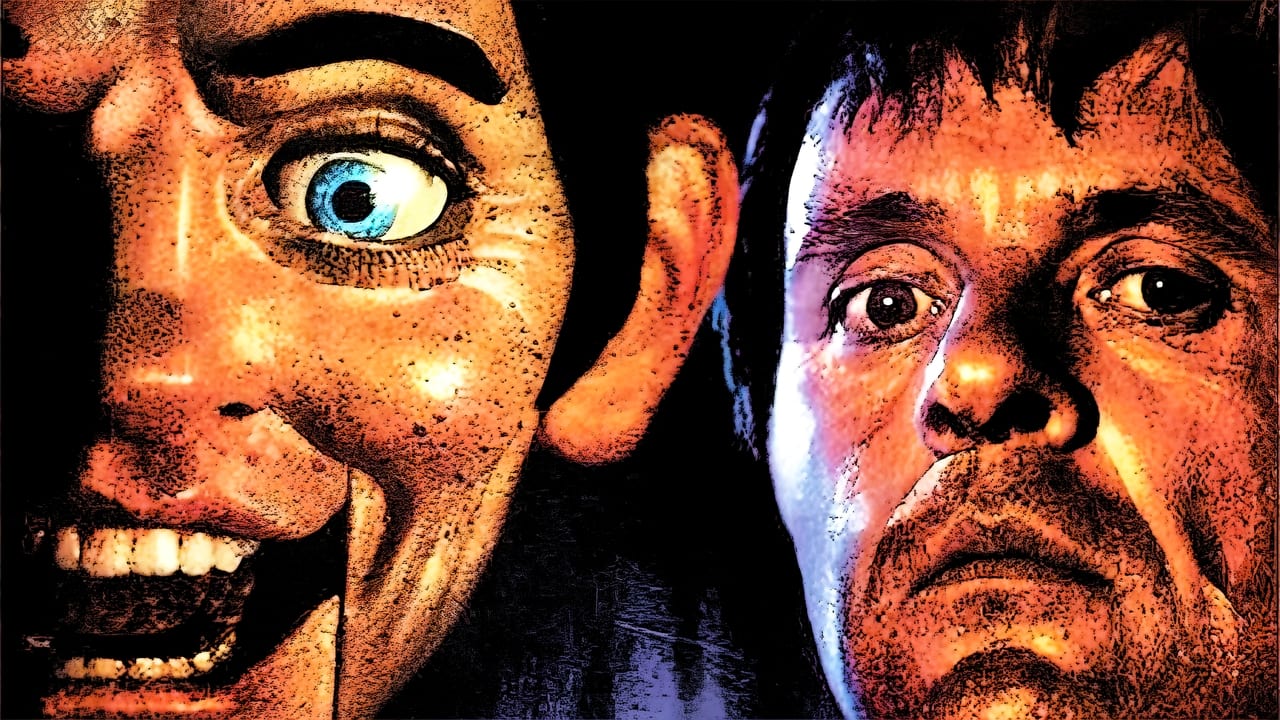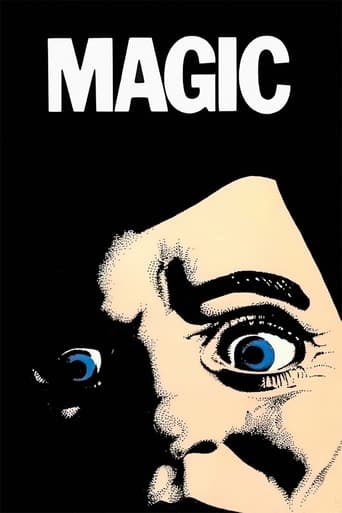Hitchcoc
Go back to "The Twilight Zone" and we have the plot of the ventriloquist's dummy becoming the alter ego of the ventriloquist. In this one, Anthony Hopkins plays a magician who is on the skids until he introduces Fats, a dummy, who somehow connects with audiences. Fats is overbearing at times but really takes on Hopkin's subconscious desires. Of course, it soon becomes obvious that Fats is directing Hopkin's actions (meaning that Hopkin's subconscious is at the surface directing him). It becomes obvious that this "dummy" is going to be the destruction of the magician. He goes away to try to pry himself from Fats's influence. Of course, he can't see what is happening. He tries to connect with a lost love, but it isn't working. Soon things take an even more dangerous turn. This is a good but creepy film.
James Hitchcock
Corky Withers is a struggling and not very successful stage magician until he comes up with the idea of combing magic with ventriloquism. He effectively forms a double act with his dummy, Fats, and the two prove a huge success. The gimmick behind the act is that Corky and Fats have completely different personalities. Corky on stage is a shy, diffident, self-deprecating young man. (Anthony Hopkins was forty at the time the film was made, but seems younger). Fats, by contrast, is a brash, cocky, wise-cracking loudmouth, ever ready to crack some bawdy joke, generally at Corky's expense. Corky is offered his own television show, but instead of signing runs off to the Catskill Mountains, where he grew up, and is reunited with his high-school sweetheart, Peggy Ann Snow, who is now unhappily married, and the two begin an affair. He is, however, unexpectedly joined in the Catskills by his agent Ben Greene, who is determined to find out the truth about Corky's sudden disappearance. And that truth is strange indeed. Corky is frightened that Fats has got out of control and has started to take over his life. By this I do not mean that the dummy is literally alive or that it has been taken over by an evil spirit like the doll in the "Child's Play" films. This may be a horror film, but it is a non-supernatural horror film in which everything that occurs has a rational explanation and which concentrates more upon psychology than upon gore. I do not even simply mean that Fats represents those aspects of Corky's personality which he has been trying to suppress. The truth is that Corky is mentally ill and suffering from schizophrenia. He uses Fats- with whom he holds conversations even off-stage- to express the other half of his split personality, and it is this, potentially violent, half which is getting stronger. When Greene discovers the truth and Peggy's husband starts to get jealous, Corky is tipped over the edge into violence. What surprises me about this film is how little-known it is, even though it was made by a well-respected director Richard Attenborough, and stars Hopkins, today widely regarded as one of the world's leading screen actors. Indeed, I had only vaguely heard of it until I caught it on television recently. Another thing that surprises me is that Hopkins was only the third choice for the role, although possibly in 1978 he was less well known than he is today, at least in America. The first choice, Jack Nicholson, turned it down. The second choice, Gene Wilder, had the support of both Attenborough and screenwriter William Goldman, but was vetoed by the producer who did not want an actor more associated with comic roles. We cannot, of course, know how the film might have turned out had either Nicholson or Wilder been cast, but I think that whoever was responsible for casting Hopkins made the right choice, because he is absolutely superb, as good as he was to be in better-known films such as "The Elephant Man", "Shadowlands" (also made with Attenborough), "Howard's End" and even "The Silence of the Lambs", for which he won an Oscar. Because of Corky's mental illness this is essentially a dual role as Hopkins has to convey quite different personalities, Corky's "normal" personality and the one he expresses though Fats, at the same time. He even has to use two different voices.( For all its vulgarity and the mayhem it leads to later, the "Fats" personality is initially an engaging one; it is clear why Corky's act was such a success). Hopkins receives good support from the lovely Ann-Margret as Peggy and Burgess Meredith as Greene.Attenborough's direction and Goldman's script are also first rate. The scenes set in the Catskills have a melancholy, autumnal quality which fits in well with the mood of the film. Without wanting to give away too much of the ending, I can say that in the final scene the talents of Hopkins, Attenborough and Goldman all combine to produce something genuinely moving. The term "neglected masterpiece" is perhaps over-used in the cinema, but in the case of "Magic" I can say that it is indeed appropriate. This is one film that really does deserve to be better known than it is at present. 9/10
gavin6942
A ventriloquist (Anthony Hopkins) is at the mercy of his vicious dummy while he tries to renew a romance with his high school sweetheart (Ann Margret).Of course, this is Anthony Hopkins' film, doing some fine work with two voices. How much is actual ventriloquism and how much was recorded after, who knows? But he more or less carries this film himself. For those who think Hopkins was not big in the horror genre until "Silence of the Lambs", this film will change your mind. But let us not forget the supporting cast.Laurence Olivier was originally offered the role of the agent but was unable to do it so Burgess Meredith was cast instead. Meredith got the role after walking into 21 one night when Joe E. Levine was there - Levine cast him on the spot. Meredith modeled his performance on the agent Swifty Lazar, even shaving his head to look like Lazar. "I tried to get his cool, understated manner, his sharp clothes and, most of all, his way of speaking softly so that you've got to lean over to hear what he's saying," said Meredith. This may be one of his best roles ever, clearly playing the stereotypical agent.

